Revolution on the Menu: The Benefits and Pitfalls of Precision Fermentation
14 December 2023
In recent years, precision fermentation has emerged as a ground-breaking technology with the potential to revolutionise various industries, particularly when it comes to food production. This innovative approach utilises genetically engineered microorganisms to produce specific compounds, proteins, and even entire food products in a controlled and efficient manner. While the prospects are exciting, it is essential to acknowledge the potential and pitfalls of this cutting-edge technology. Let’s take a look at them in turn.
Benefits
Sustainable Food Production:
Precision fermentation offers a promising solution to the growing global demand for food while minimising environmental impact. By producing proteins and other nutritional elements through microbial fermentation, we can reduce the reliance on traditional agriculture, which often contributes to deforestation, excessive water usage, and greenhouse gas emissions.
Customisation and Nutritional Precision:
One of the critical strengths of precision fermentation is its ability to tailor the composition of food products to meet specific nutritional needs. This level of customisation could revolutionise dietary choices, providing individuals with the nutrients they require for optimal health.
Economic Efficiency:
Precision fermentation has the potential to streamline the food production process, leading to increased efficiency and reduced costs. With controlled environments and faster production cycles, companies can bring products to market more quickly, benefiting producers and consumers.
Pitfalls:
Regulatory Challenges:
The rapid evolution of precision fermentation has outpaced regulatory frameworks, leading to uncertainties and challenges in ensuring these technologies’ safety and ethical implications. Establishing clear guidelines and standards is crucial to prevent potential risks to human health and the environment.
Consumer Acceptance:
Convincing consumers to embrace precision-fermented products may take a lot of work. Public perception and acceptance of lab-grown or engineered foods can be influenced by taste, cultural biases, and concerns about the unknown long-term effects on health.
Ecosystem Impact:
The unintended consequences of releasing genetically modified microorganisms into the environment raise ecological concerns. It is crucial to thoroughly assess the potential impact on ecosystems, ensuring that precision fermentation does not inadvertently disrupt natural processes.
Precision fermentation promises to transform how we produce and consume food, offering sustainable solutions to global challenges. However, careful consideration must be given to regulatory frameworks, consumer perceptions, and ecological impacts to ensure that the transition to precision fermentation is both responsible and beneficial. By addressing these challenges, we can unlock the full potential of this innovative technology and pave the way for a more sustainable and efficient future in food production.
– By Mariusz Bogacki, Researcher and Science Communicator, Edinburgh
At Visiativ, we work with a wide variety of innovative companies in different industry sectors, from Engineering, to Manufacturing and Life Sciences. Our experts help companies get access to funding through R&D Tax Relief, our expertise in this field has enabled us to secure millions of pounds in benefits for our clients in the UK, with an average of £3.3 million in eligible claims being identified on a weekly basis. If you’re investing into research and development activities, your company could be eligible for R&D Tax Relief, why not take our eligibility questionnaire to find out if you qualify.








